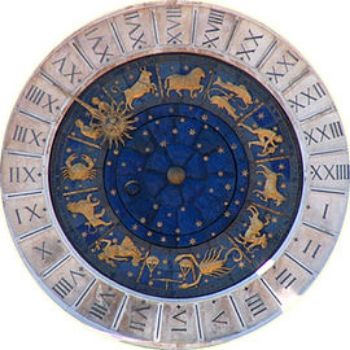 Timing of
events is a question I am often asked. For example, 'when will I get married,
make money, get a new job meet the next boyfriend, when will he call,' etc.
Timing of
events is a question I am often asked. For example, 'when will I get married,
make money, get a new job meet the next boyfriend, when will he call,' etc.
In predictive astrology timing is everything. As a matter of fact, you can't make predictions using astrology without timing events. Predictive astrology interprets current and future cycles or periods of life utilizing placement of the planets or transits which result in events of all types that are part of the ongoing cycle of life. Many tools are utilized in this process. A simple question may be answered such as 'when will we communicate', or a much more complex one like, ' when 'will I achieve professional status in life.'
A great deal can be discovered by looking at an individual natal chart. This chart is created using the day, year and time of birth, and each chart is unique. The chart shows what sign each planet is in as well as which house, and the signs ruling the houses and planets.
Each house of the chart is like a stage upon which the play is set and in this case the play is called life. For example, the fourth house rules home and family, the fifth house rules friends, children and love affairs, the sixth house rules work, and the seventh marriage and partnerships and on and on. Each house rules a different area of your life, or a different segment of the play of life. The planets are like the actors in the play and the zodiac signs tell us the personality of the actors and what their psychological leanings and tendencies and traits are.
As the planets move (transit) through the sky-the Sun, Moon, Mercury, Venus, Mars, Jupiter, Saturn, Uranus, Neptune and Pluto, they interact with the planets in your natal chart, and as these planets interact with your personal chart they create aspects (degrees of separation to the natal planets) and events in your life occur based on the timing of the transit!
So, timing is natural to astrology, and without it there can be no predictions.
The major aspects astrologers use are the trine, sextile, conjunction, and opposition.
Traditional astrology has been dated to the 3rd millennium, with roots in calendrical systems used to predict seasonal shifts and to interpret celestial cycles as signs of divine communication with man. Until the 17th century, astrology was considered a scholarly tradition, and it drove the development of astronomy and was commonly accepted in political and cultural circles. Mundane astrology was often used which predicted events pertaining to countries, kingdoms and groups of people as a culture, and timing was piece de resistance, as it is today in all traditional/predictive astrology.
I use predictive and traditional astrology most of the time, the focus of which is outer events and predictions that will occur in our lives, as opposed to psychological astrology, which became common in the 20th century. You cannot understand traditional astrology fully without studying the concepts of psychological astrology, however. Many of my blog predictions are based on Mundane astrology.
Psychological astrology which came to vogue with Carl Jung, reached a heyday in the 1960's- 1980's, and is excellent for character analysis and psychological insight, but cannot predict events like traditional astrology. Many of those engaged in this form of astrology don't make predictions, rather focus on character analysis or compatibility, mental, emotional and psychological attributes and development.
From 1700-1900 traditional astrology had few serious practitioners, but with the advent of and interest in the esoteric sciences made popular by groups as the Theosophists, traditional astrology came to be studied and welcomed again.
Timing is all important in electional astrology and horary astrology as well.
Electional astrology encompasses the art of perfect timing by choosing or electing the best time to begin a particular event or start an activity such as getting married. Every event including marriage has a chart!
Horary astrology answers a question by constructing a chart based on the time and place the question is asked and answers questions on timing.
Timing is important and is utilized in all forms of astrology except psychological astrology.